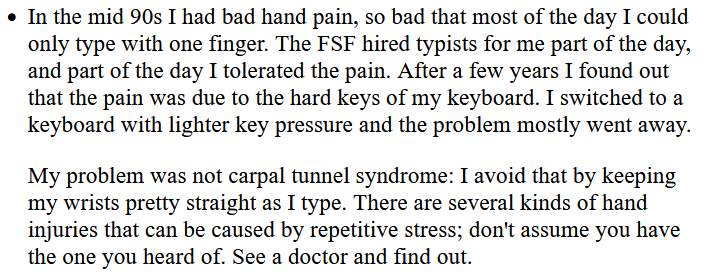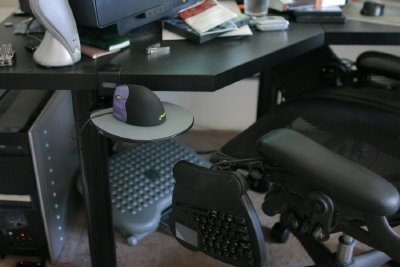Famous Programers with Repetitive Strain Injury
Read the story of Richard Stallman (Creator of FSF, GNU, GPL, GCC, Emacs), John Ousterhout (creator of Tcl), Jamie W Zawinski (XEmacs, Netscape, Mozilla), who injured their hands seriously because of typing on keyboard, in particular, due to use of Emacs.
Richard Stallman, Free Software Foundation Founder
Richard Stallman (aka RMS)'s keyboard-induced hand injury is well known during the 1990s. I remember reading about it somewhere on his website in the 1990s. At one point, i remember that he is trying to switch to a voice system.
i cannot find the original article of 90s, but here's a snippet from his current blog.

Here's a secondhand description of Stallman's hand injury.
Fast forward twenty years and I was working 12-16 hours a day hacking on the GNU C++ compiler with more than 100,000 lines of code to my name, and loving every minute of it. One weekend I visited Richard Stallman at MIT and I was shocked to learn that he could no longer type. He was given strict instructions by his doctor to not touch a computer keyboard for 6-12 months, and that if he did, he may lose forever his ability to type. He was a programming pioneer, and at the time, his symptoms were not well known or understood. We all came to understand that it was RSI—repetitive stress injury, exacerbated by the very keystroke combinations that made the Emacs editor such a powerful programming environment. But the root cause was not Emacs—it was the punative design of the QWERTY keyboard, a legacy of the industrial era when complex keyboard mechanisms were not able to keep up with the speed of human fingers. …
- Which Keyboard?
- By Michael Tiemann.
http://news.cnet.com/8301-13507_3-9732586-18.html
Note: Michael Tiemann was a founder of Cygnus (Cygwin), then later was CEO of Redhat when Redhat bought it.
Michael Tiemann blamed QWERTY, but actually, more than 50% of typing by programers is not letters but keyboard shortcuts. (e.g. move cursor, delete text, edit code, code formatting, open/close file, switch file, page up/down, etc.)
See:
Jamie W Zawinski
Jamie Zawinski is the main developer of XEmacs, when it was called Lucid Emacs around 1992.
Richard Stallman blames Jamie for the emacs/xemacs schisim. Jamie is also well known for being the main developer of Netscape browser when the web started in 1990s.
Jamie keeps a diary on computer, before there's a word “blog”, and in his writings scattered around his diaries he has talked about his hand injury situation, in his dot com work-to-death years.
Here are quotes from his writings online:
For several years I had pretty severe wrist pain, and it terrified me. I had these visions of me with withered stumps at the ends of my arms, trying to limp along using speech-recognition software, and my career being over.
- my wrists and welcome to them
- By Jamie Zawinski.
- https://www.jwz.org/gruntle/wrists.html
My hands have been really been hurting lately; I hope all this typing hasn't finally blown out my wrists. If I can't type, my life is over. My right hand especially is flaking out — the last knuckle of the middle two fingers ache, as if they're badly bruised. I guess it's time to figure out how to use our medical program. As if a doctor is going to tell me something other than “stop typing so much.” Ha ha ha, that's a good one.
- the netscape dorm
- By Jamie Zawinski.
http://www.jwz.org/gruntle/nscpdorm.html
Besides visiting doctors and following other ergonomic practices such as taking breaks, Jamie now uses a 2-piece split keyboard the Kinesis Evolution. (the Evolution is discontinued. Now you just have Kinesis Freestyle.). It's like a keyboard cut into 2 pieces, connected only by wire. One on each side of chair's arm.

see
Before that, he likes and endorses Microsoft's Ergonomic Keyboards, but did not like Kinesis Model 100 (1992) .
as of 2016-09-01, he's using Matias Ergo Pro Keyboard. [See https://www.jwz.org/blog/2015/11/keyboard-lossage-mouse-lossage-everything-is-terrible/]
Ben Wing, XEmacs Main Developer
Ben Wing, is the main developer of XEmacs in the 1990s, after Jamie W Zawinski.
Following is a quote from XEmacs Home Page for Ben Wing @ http://xemacs.org/People/ben.wing/.
Since September 1992, I've worked on XEmacs as a contractor for various companies and more recently as an unpaid volunteer.
Alas, life has not been good to me recently. This former San Francisco “Mission Critter” developed insidious hand and neck problems after a brief stint working on a Java-based VRML toolkit for the now defunct Dimension X, and I was forced to quit working. I was exiled first to “Stroller Valley” and later all the way to Tucson, Arizona, and for two years was almost completely disabled due to pain. More recently I have fought my way back with loads and loads of narcotic painkillers, and after a stint as an art student at the University of Arizona I'm currently a Ph.D. student in linguistics at the University of Texas, Austin.
as of 2013-03-13, Ben Wing has a linkedin profile at
See also: My Experience of GNU Emacs vs XEmacs (2007) and GNU Emacs and XEmacs Schism, by Ben Wing.
John Ousterhout
John Ousterhout, well known as the inventor of the Tcl language, developed RSI. He switched to using a voice system for almost everything. Here's his article on RSI.
Dealing With RSI (1995 to 2007) By John Ousterhout. @ http://home.pacbell.net/ouster/wrist.html
[https://web.stanford.edu/~ouster/cgi-bin/wrist.php 2022-03-18]
(local copy Dealing_With_RSI_by_John_Ousterhout_2007_08_21.txt)
I started having pain in my left wrist in 1995, and the problems got progressively worse in spite of (and partly because of) various attempts at treatment. In 1996 I started using a speech recognition system and stopped using my left hand for any typing at all.
My experience suggests that once you start having RSI problems they are unlikely to go away by themselves. Everyone I've ever heard of with RSI problems (myself included) ignored early warning signs and didn't take action anywhere near soon enough, even when the symptoms started becoming severe. It's not clear to me that you can ever "recover" from RSI; all you can do is stabilize at your current level of disability. If there is any recovery, it takes many years.
2010-07-11 Addendum: I asked whether John is a emacs user. Richard Fateman wrote to me and said no. Quote:
FYI Ousterhout hated emacs, vehemently, at least when he was at Berkeley. He used VI.
Others
Bill Clementson, a long time lisp programer and emacs user (career started in 1992 according to resume), developed RSI, and adopted the
Kinesis Advantage Keyboard as a solution.
He wrote about 7 blog articles about it from 2004 to 2006. See his blog at: http://bc.tech.coop/blog/060623.html.
Alex Schroeder 〔http://www.emacswiki.org/emacs/AlexSchroeder〕 , best known as the one who started emacswiki.org, also developed RSI. He also got a Kinesis Advantage Keyboard. You can find some discussion about RSI here: http://www.emacswiki.org/emacs/RepeatedStrainInjury
Emacs and RSI Joke
Here's a very funny story relating RSI and emacs.
The Real Reason Unix Hackers Get R.S.I.
- From: Patrick Sobalvarro <pgs@pa.dec.com>
- Subject: RSI epidemic
- Date: Sunday, August 13, 1995 1:26PM
Friday I was talking to my friend Johnson from the CDC, who told me that the CDC had been doing an epidemiological study of clustered RSI cases among computer scientists. He said that they've been waiting to act until their internal review process is completed, but it seems that there is indeed an infectious agent causing RSI. But it's not a biological agent. It's software.
“In particular,” Johnson told me, “the significant vector among academics is Emacs.”
“Emacs?” I gasped.
“Oh yes,” he continued; “Didn't you ever notice that two of the first people in the computer science community around MIT who suffered from RSI were Richard Stallman and Bernie Greenberg ? What were those people implementing fifteen or twenty years ago? That's what tipped us off.”
We were having lunch at the cafeteria at Moffett Field. Johnson watched my hands throughout the meal. “Hey buddy. You're still doing okay anyway, aren't you? It's good to see that. Really good.” He smiled, then looked at his watch and asked, “Walk me to the terminal, will you?”
I accompanied him to the little facility where crew-cut young men in uniform and their dependents, trailer-park girls with squawling babies, sat around waiting for MAC flights to other military facilities. A black helicopter, curiously silent, was waiting on the tarmac outside, its rotors turning lazily in the sunlight. “Ah, that'd be my flight,” said Johnson. “Old Uncle Sam always sends you first-class, ha ha.”
We shook hands. A little anxiously, I asked, “But what will you do about it? About the epidemic?”
Johnson paused before answering. He looked outside at the black helicopter. The pilot had seen him now; in his helmet and visor he appeared strangely insectile as he regarded Johnson patiently. I noticed the booms extending from the sides of the helicopter, where standardized weapons pods could be attached. “Patrick, old buddy,” said Johnson playfully, “Back in high school people said you were smart, but I never thought you had an ounce of sense in your head. Listen: our charter is to protect the people of the United States of America by containing epidemics and eliminating disease. We have many… tools… at our disposal. Why don't you take a break for a while? Go someplace where people don't use Emacs. Where they never heard of Emacs. Don't take it with you. Go to Hawaii — better yet — go to Redmond. Okay?” He punched my shoulder, smiling. I winced.
Then he strode out onto the tarmac, giving a thumbs-up to the pilot, who spun up the turbines. There was almost no noise. I didn't wait to watch them take off.
Apparently it's a email that's been circulating around.
It can be seen collected at
http://www.petting-zoo.net/~deadbeef/archive/304.html, http://hackvan.com/pub/stig/scripture/religions-of-technology/the-real-reason-UNIX-hackers-get-RSI.htm.
Mentioned in the story is Bernie Greenberg. He implement Emacs on Multics in 1978. (Richard Stallman, Guy Steele, David Moon implemented Emacs on ITS and TWENEX in 1976). For detail, see: GNU Emacs and XEmacs Schism (2001).